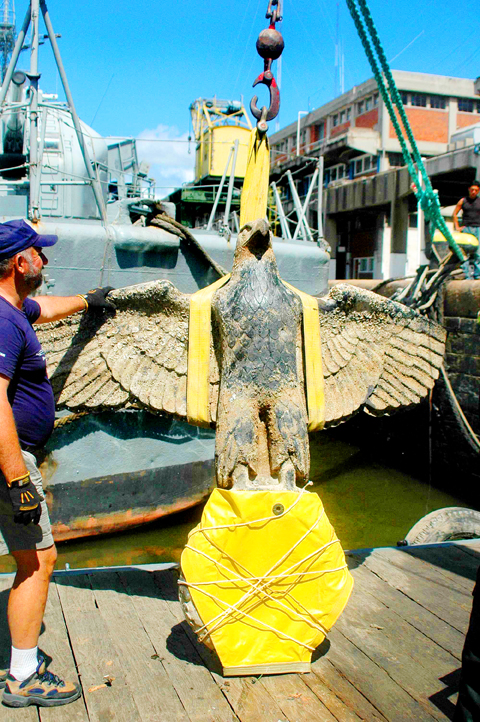The Admiral Graf Spee, the German “pocket battleship” scuttled here in 1939, is caught in the middle of a struggle between the businessman salvaging it and the German government, which wants to prevent its commercialization.
“We always proposed a serious historical and cultural destiny” for the remains of the Graf Spee while “contemplating fair compensation” for the work and investment made to recover its remains, said Alfredo Etchegaray, the businessman.
During a visit to Montevideo last week, German Foreign Minister Guido Westerwelle said his desire was “to prevent the remains of the symbols of the Nazi regime from becoming commercialized.”

PHOTO: AFP/ALFREDO ETCHEGARAY
“What we want really is to reach a constructive deal,” he said, adding that Germany was prepared to support the presentation of the remains “in a historical context, like a museum.”
In 2006, divers hired by Etchegaray recovered an imposing Nazi bronze eagle measuring 2.8m wide by 2m high and weighing 350kg from the stern of the Graf Spee.
Two years earlier, they had come up with a 24.5 tonne rangefinder used to direct the ship’s cannons. And in 1998, a 155mm gun from the ship’s secondary armament was salvaged.
The underwater salvage group planned to bring up more cannons and other pieces of the Graf Spee, but were barred from doing so by an Uruguayan government decree.
After the recovery of the Nazi eagle, with its outspread wings and swastika, Germany sent a note to the Uruguayan foreign ministry claiming ownership of the Graf Spee and opposing continuation of the salvage work.
Etchegaray, who had received permission from the Uruguay government to undertake the salvage work, has spent US$2.5 million over the past 25 years scouring the Rio de la Plata estuary for sunken ships.
The Graf Spee was scuttled by its captain just outside Montevideo harbor where it had gone for repairs after the first major naval battle of World War II.
The Nazi warship was used to raid commercial shipping in the Atlantic until it was intercepted by two British cruisers and one from the New Zealand navy off Montevideo.
Etchegaray claims the wreck was sold in 1940 by the then German ambassador Otto Langmann to Uruguayan Julio Vega Helguera, who concluded the deal as an undercover agent for the British government for £14,000 (US$21,260).
The sale is recorded in the diplomatic dispatches preserved in the Public Record Office in London, a copy of which was provided to reporters by Etchegaray.
Etchegaray said that in 1973 Uruguay issued a decree claiming ownership of all shipwrecks in its waters.
“For the past four years I have been proposing a museum ... or an auction with a prequalification of interested parties and a guarantee of a historic-cultural destination for the [eagle],” he said.

Australia has announced an agreement with the tiny Pacific nation Nauru enabling it to send hundreds of immigrants to the barren island. The deal affects more than 220 immigrants in Australia, including some convicted of serious crimes. Australian Minister of Home Affairs Tony Burke signed the memorandum of understanding on a visit to Nauru, the government said in a statement on Friday. “It contains undertakings for the proper treatment and long-term residence of people who have no legal right to stay in Australia, to be received in Nauru,” it said. “Australia will provide funding to underpin this arrangement and support Nauru’s long-term economic

ANGER: Unrest worsened after a taxi driver was killed by a police vehicle on Thursday, as protesters set alight government buildings across the nation Protests worsened overnight across major cities of Indonesia, far beyond the capital, Jakarta, as demonstrators defied Indonesian President Prabowo Subianto’s call for calm. The most serious unrest was seen in the eastern city of Makassar, while protests also unfolded in Bandung, Surabaya, Solo and Yogyakarta. By yesterday morning, crowds had dispersed in Jakarta. Troops patrolled the streets with tactical vehicles and helped civilians clear trash, although smoke was still rising in various protest sites. Three people died and five were injured in Makassar when protesters set fire to the regional parliament building during a plenary session on Friday evening, according to

‘NEO-NAZIS’: A minister described the rally as ‘spreading hate’ and ‘dividing our communities,’ adding that it had been organized and promoted by far-right groups Thousands of Australians joined anti-immigration rallies across the country yesterday that the center-left government condemned, saying they sought to spread hate and were linked to neo-Nazis. “March for Australia” rallies against immigration were held in Sydney, and other state capitals and regional centers, according to the group’s Web site. “Mass migration has torn at the bonds that held our communities together,” the Web site said. The group posted on X on Saturday that the rallies aimed to do “what the mainstream politicians never have the courage to do: demand an end to mass immigration.” The group also said it was concerned about culture,

CRACKDOWN: The Indonesian president vowed to clamp down on ‘treason and terrorism,’ while acceding to some protest demands to revoke lawmaker benefits Protests in Indonesia over rising living costs and inequality intensified overnight, prompting Indonesian President Prabowo Subianto to cancel a planned trip to China, while demonstrators reportedly targeted the homes of the finance minister and several lawmakers. Rioters entered Indonesian Minister of Finance Sri Mulyani Indrawati’s residence near Jakarta early yesterday, but were repelled by armed forces personnel, Kompas reported. Items were taken from the homes of lawmaker Ahmad Sahroni and two others, according to Detik.com. The reports of looting could not be independently verified, and the finance ministry has not responded to requests for comment. The protests were sparked by outrage over